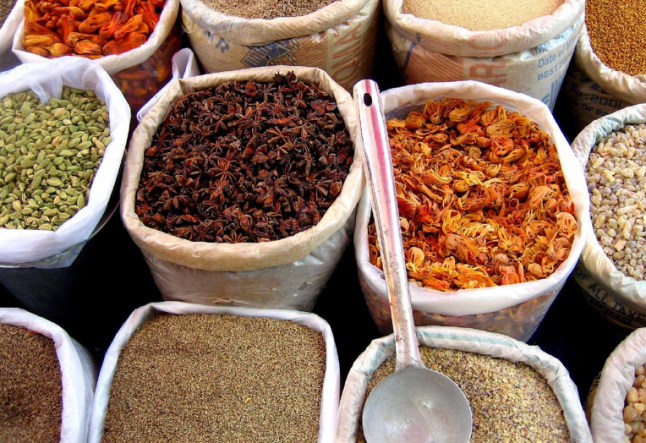celebrate food the ayurvedic way

Cooking Food Ayurveda India Health Vata Pitta Kapha Doshas
One of my fondest memories of growing up was watching my mother cook for her family and her guests. The Indian culture has a passion for feeding people, perhaps because it sees every being as part of the divine. She acknowledged that we are all creators of Spirit and that feeding people is a gesture of offering thanks to the Creator and for nature’s bountiful harvests.
Growing up, it did not occur to me that my mom planned every meal with divine care.
She would pick the vegetables for the season, choose the appropriate herbs and spices for proper health and concoct remedies such as rasam, a south Indian soup made up mainly of tamarind and tomatoes when one of us children got a cold.
Today, as nutrition and dietary guidelines receive a lot of media coverage, I realize how my mother, unbeknownst to me, had infused the ancient principles of Ayurveda into her culinary undertakings, from the daily feeding of our family of six to feasting with hundreds of guests.
In Ayurveda, food is celebrated based on certain scientific principles designed to provide optimal wellbeing and nourishment for both the physical body and for mental clarity. Comprised of vata, pitta or kapha, the doshas or elements that make up the unique composition of an individual, it is in the interplay of earth, water, fire, air and space that we find our true balance and connection to our bodies and minds. As abstract as it may seem at first, an individual discovers his or her own true nature and beauty by having a connection with these elements. Ayurveda with its doshic system recognizes that each individual and their state of dis-ease has to be dealt with through proper guidance in nutrition amongst other lifestyle recommendations such as yoga, regular oil body therapies and meditation.
Ayurveda promotes the idea that food should be enjoyed both for the pleasure of its taste and for providing the fuel to sustain ourselves. But more importantly, it should not introduce ama or toxins into the body. Hence, cleanses are an integral part of rekindling the natural rhythms of our bodies so we are in tune with nature and its elements. The traditional Panchakarma (or “five actions”) is an ancient routine of purification,
toxification and rejuvenation and is especially recommended during seasonal changes, various transitions in our lives (including planning a family), or simply connecting to ourselves to restore and rediscover our inner and outer beauty. It is a time to get off the freeway and onto a trail of introspection and discovery of our innate nature. With the purging of physical toxins, a synergistic release of toxins from the mind can also take place leading to better mental calmness and clarity.
Various treatments and therapies are part of this rejuvenating and deeply detoxifying program, ranging from customized oil therapies to bastis (enemas). But the real beauty of such a cleanse undoubtedly resides in the love and care in which fresh food is prepared, cooked and served according to an individual’s path to doshic balance.
Take for example kitcheree, the traditional healing food served during Panchakarma, a mixture of mung dhal and basmati rice that is easy to digest, nutritious and purifying. Together with the unctuous texture of ghee (clarified butter), a staple food in Ayurveda, kitcheree restores the vitality (ojas) of the tissues and improves their strength. When combined with specific vegetables, spices and herbs appropriate for an individual’s need, this ancient ritual becomes an act of pure love and compassion for a person’s physical and spiritual awareness.
A meal served with a moment of silence and mindful gratitude for the sources from which the ingredients come from, not only makes food easier to digest, but also acts as energy to restore our spirits.
It is in the restoration of my spirits and in the silence that follows that I reminisce of my mother’s art of conscious intent and love in her cooking. Her magnanimous heart sees no boundaries in feeding her fellow beings. As I discover my path to optimal wellness, I am grateful for my mother’s wisdom for subtly sharing the ageless and timeless science of Ayurveda with me.